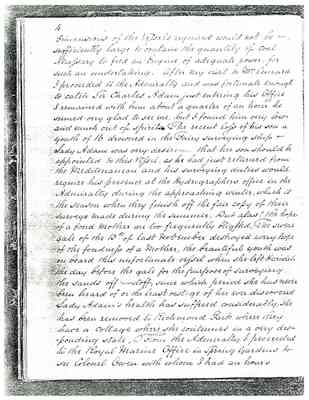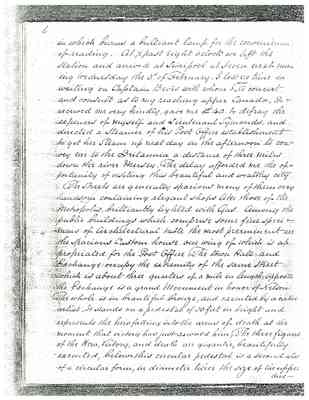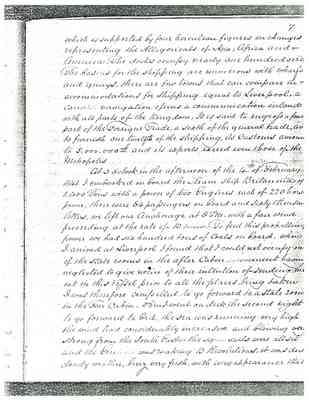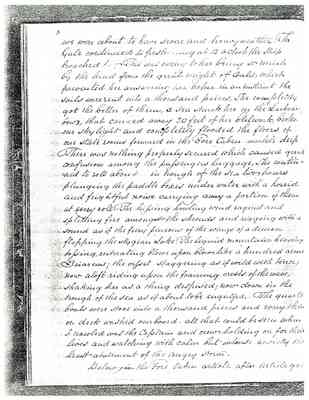Pages
6
4 Dimesions of the Vessels required would not be sufficiently large to contain the quantity of coal necessary to feed an engine of adequate power, for such an undertaking. After my visit to Mr. Cunard I proceeded to the Admiralty and was fortunate enough to catch Sir Charles Adam just entering his Office. I remained with him about a quarter of an hour, he seemed very glad to see me, but I found him very low and much out of spirits. The recent loss of his son a youth of 16 drowned in the Fairy surveying ship. Lady Adam was very desirous that her son should be appointed to this Vessel, as he had just returned from the Mediterranean, and his surveying duties would require his presence at the Hydrographers office in the Admiralty during the approaching winter, which is the season when they finish off the fair copy of their surveys made during the summer. But alas! the hopes of the fondness of a Mother, the beautiful youth was on board this unfortunate vessel when she left Harwich the day before the gale for the purpose of surveying the sands off Lowestoft, since which period she has never been heard of or the least vestige of her ever discoverd. Lady Adam's health has suffered considerably, she has been removed to Richmond Park where they have a cottage where she continues in a very desponding state. From the Admiralty I proceeded to the Royal Marine Office in Spring Gardens to see Colonel Owen with whom I had an hour's
7
5 audience. Colonel Owen assured me that he would send an Officer out to relieve me the moment I should be promoted, an event I do not consider to be at hand from the Office I proceeded to Somerset house where I had an audience with Mr Briggs the Accountant General of the Navy, who stated that he had given directions to Captain Bevis Superintendent of Mail Packets at Liverpool to afford me every facility and assistance in embarking my luggage on board the steamer, to pay my passage to Boston and to supply me with the money necessary to defray my own expences together with those of Lieutenant Symonds from Boston to Kingston.
From Somerset House I proceeded to the City saw Messrs Marsden and Shaw, made a transfer, wrote a letter to my dear Dorcas enclosing the Bank receipt. I then went to the Bank saw Mr Lewis, and received a Dividend on the Long Annuities, walked to the Belle Sauvage and took my luggage to the Railway Station, and took my place in the Mail Coach of the Mail train that was to leave that evening at eight. As the Station is not far from the Regent Park and as it was now four o clock, I thought I would call on Mr Platt, who I found at home with his Mother and two nieces they invited me to dinner and I spent an agreeable pleasant evening. I left them at eight, and in half an hour found myself seated in very neat commodious carriaged called one of the Royal Mails. These carriages carry the Post bags, they are doubt[..] like the common mail coach on the road, with this difference that you sit in a very easy armchair, and these carriages are also deeper and higher in the roof in
8
in which burns a brilliant lamp for the convenience of reading. At 1/2 past eight o'clock we left the station and arrived at [Liverpool] Seven next morning Wednesday the 3rd of February. I lost no time in waiting on Captain Bevis with whom I was to concert and consult as to my reaching upper Canada. He received me very kindly, gave me £40 to defray the expenses of myself and Lieutenant Symonds, and directed a Steamer of his Post Office establishment to get her Steam up next day in the afternoon to convey me to the Britannia a distance of three miles down the river Mersey. The delay afforded me the opportunity of visiting this beautiful and wealthy city.
The Streets are generally spacious many of them very handsome containing elegant shops like those of the Metropolis, brilliantly lighted with Gas. Among the public buildings which comprise some fine specimens of Architectural taste the most preeminent are the spacious Custom house one wing of which is appropriated for the Post Office. The town Hall and Exchange occupy the extremity of the same street which is about three quarters of a mile in length. Opposite the Exchange is a grand Monument in honor of Nelson. The whole is in beautiful bronze, and executed by a native artist. It stands on a pedestal of 30 feet in height and represents the hero falling into the arms of death at the moment that victory has just crowned him. The three figures of the Hero, Victory, and death are gigantic, beautifully executed, below this circular pedestal is a second also of a circular form, in diameter twice the size of the upper one
9
7 which is supported by four herculean figures in [chargers?] representing the Allegoricals of Asia, Africa and America. The docks occupy nearly one hundred acre. The basins for the shipping are numerous with wharfs and quays, there are few towns that can compare in accommodations for shipping equal to Liverpool, a canals navigation opens a communication inland with all parts of the Kingdom. It is said to ingross a four[..] part of the Foreign Trade, a sixth of the general trade, [and] to furnish one twelfth of the shipping, its Customs amount to 5,000.000£ and its exports exceed even those of the Metropolis.
At 3 o'clock in the afternoon of the 4th of February 1841 I embarked on board the Steam ship Britannia of 1400 Tons with a power of two Engines each of 220 horse power, there were 84 passengers on board and sixty thousand letters, we left our Anchorage at 8 PM. with a fair wind proceeding at the rate of 10 knots. To feed this propelling power we had six hundred tons of coals on board when I arrived at Liverpool I found that I could not occupy one of the state rooms in the after Cabin, government having neglected to give notice of their intention of sending me out in this Vessel prior to all the places being taken I was therefore compelled to go forward to a state room in the Fore Cabin. When I went on deck the second night to go forward to bed, the sea was running very high the wind had considerably increased and blowing very strong from the South East the square sails were all set and the [Engine?] was making 13 Revolutions, it was dark cloudy weather, breezy very fresh, with every appearance that
10
8 we were about to have severe and heavy weather. The Gale continued to freshening at 12 o'clock the Ship broached top. This was owing to her being so much by the head from the great weight of coals, which prevented her answering her helme, in an instant the sails were sent into a thousand pieces, She completely got the better of them, a sea struck her on the Starboard bows, that carried away 20 feet of her bulwark, broke our sky light and completely flooded the floors of our state rooms forward in the Fore Cabin ankle deep. There was nothing properly secured which caused great confusion among the passengers luggage. She continued to roll about in trough of the sea two hours plunging the paddle boxes under water with a horrid and frightful noise carrying away a portion of them at every roll. The hissing howling wind raging and splitting fire amongst the shrouds and rigging with a sound as if the fiery pinions of the wings of a demon flapping the stygian Lake. The liquid mountains heaving tossing, reiterating blows upon blows like a hundred armed Briarcus; the vessel staggering as if wild with terror; now aloft riding upon the foaming crests of the wave, shaking her as a thing despised, now down in the trough of the sea as if about to be engulged. The quarter boats were stove into a thousand pieces and everything on deck washed overboard. All that could be seen when I crawled was the Captain and crew holding on for their lives and watching with calm but intense anxiety the least abatement of the angry storm.
Below in the Fore Cabin article after article got







